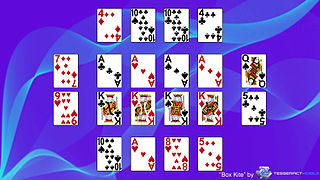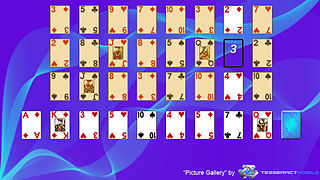
Games of patience, or (card) solitaires as they are usually called in North America, have their own 'language' of specialised terms such as "building down", "packing", "foundations", "talon" and "tableau". Once learnt they are helpful in describing, succinctly and accurately, how the games are played. Patience games are usually for a single player, although a small number have been designed for two and, in rare cases, three or even four players. They are games of skill or chance or a combination of the two. There are three classes of patience grouped by object.

Agnes is a patience or solitaire card game that emerged in England about the same time as Klondike appeared in the US. The classic version has the unusual feature of packing in colour, a feature it shares with Whitehead. By contrast, the later American variant appears to have been influenced by Klondike with packing is in alternate colours. The classic game has been described as the best single-pack patience yet invented.
Bisley is a patience or card solitaire which uses a deck of 52 playing cards, and while difficult, it often can be completed successfully. It is closely related to Baker's Dozen, but the foundations are built upwards from Ace and downwards from King simultaneously. It is one of the few one-deck games in which the player has options on which foundation a card can be placed.
Matrimony is a patience or card solitaire game that uses two packs of 52 playing cards. It is a difficult game which depends mostly on luck and is sometimes mechanical.
Big Ben is a patience or card solitaire which uses two decks of playing cards mixed together. It is named after Big Ben, the nickname of the clock tower of the Palace of Westminster in London.

Kings in the Corner, or King's Corners is a multi-player patience or solitaire-style card game for two to four players using a standard 52-card pack, the aim being to be first to shed all one's hand cards.
Archway is a patience or solitaire card game of the open builder type that uses two packs of 52 playing cards. Its goal is to bring all 104 cards into the foundation. It was invented by David Parlett, and is based on an old French solitaire game called La Chatelaine.

La Belle Lucie is a patience or card solitaire where the object is to build the cards into the foundations. It is considered to be representative of the "fan" family of solitaire card games, and has a pleasing layout.
Algerian or Algerian Patience is a unique and difficult patience or card solitaire using two decks of playing cards. The object of the game is to build 8 foundations down from King to Ace or up from Ace to King in suit.
Aces and Kings is a challenging and original solitaire game using two decks of playing cards, and was created by Thomas Warfield. The object of the game is to build 8 foundations down from King to Ace or up from Ace to King without regard to suit.
American Toad is a patience or card solitaire game played using two standard packs of playing cards. It is similar to Canfield except that the tableau builds down in suit, and a partial tableau stack cannot be moved, only the top card or entire stack. The object is to move all cards to the foundations.
Batsford is a patience or card solitaire similar to Klondike except that it uses two decks instead of one. The cards are turned up one at a time during a single pass through the deck, and there is also a reserve pile available for a single King.
Beetle is a difficult patience or solitaire card game using two decks of playing cards. The game is similar to Spider, except the Tableau cards are faced up. The object of the game is to group all of the cards into sets of 13 in suit.

Box Kite is a moderately difficult patience or card solitaire using two packs. The object of the game is to move all of the cards to the foundations. It is a variant of the old game of St. Helena.
Casket is a moderately easy solitaire game using two decks. The object of the game is to move all of the cards to the foundations.
Corona is a relatively long and difficult patience or card solitaire using two decks. The object of the game is to move all of the cards to the foundations. Successfully winning the game is considered difficult.

Josephine is a patience or solitaire card game using two decks of playing cards. The object of the game is to move all of the cards to the Foundations. It is a variant of the more commonly known Napoleon at St Helena, and is named after Josephine de Beauharnais, Napoleon's first wife.

Royal Parade is an old, English, two-pack patience of the half-open builder type. The object of the game is to move cards to the foundations to create a 'gallery' full of picture cards.

Australian Patience is a patience or card solitaire using one deck of playing cards. This game is a challenging combination of Klondike and Scorpion, and is also closely related to Yukon. The object of the game is to move all of the cards to the Foundations.
Double Canfield is a patience or card solitaire game using two decks of playing cards. The object of the game is to move all of the cards to the Foundations.









